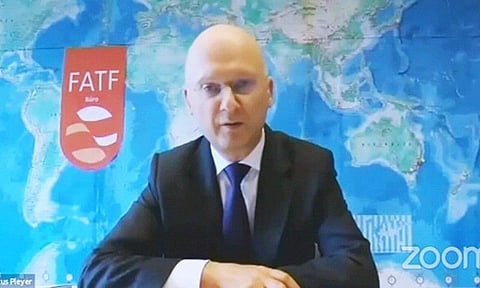Pakistan remains on Financial Action Task Force grey list despite ‘significant progress’
Pakistan has been on FATF grey list since 2018 and has enacted laws to address concerns

Also In This Package
Islamabad: The Financial Action Task Force (FATF) has decided to keep Pakistan on its ‘grey list’ until October 2021 despite complying with 26 out of 27 action plans.
“Pakistan has made significant progress” and has “largely addressed 26 of the 27 action items” since 2018 but the country remains on the grey list, announced FATF President Marcus Pleyer in a press briefing held after FATF’s virtual five-day (June 21-25) plenary session in Paris.
Pakistan was urged to address the one remaining action item related to investigations and prosecutions of “senior leaders and commanders of UN designated terrorist groups”, he said.
The new action plans urge Pakistan to address these concerns:
* Enhancing international cooperation by amending the mutual legal assistance (MLA) law. * Demonstrating that assistance is being sought from foreign countries in implementing UNSCR 1373 designations. * Demonstrating that supervisors are conducting both on-site and off-site supervision commensurate with specific risks associated with DNFBPs, including applying appropriate sanctions where necessary. * Demonstrating that proportionate and dissuasive sanctions are applied consistently to all legal persons and legal arrangements for non-compliance with beneficial ownership requirements. * Demonstrating an increase in ML investigations and prosecutions and that proceeds of crime continue to be restrained and confiscated in line with Pakistan’s risk profile, including working with foreign counterparts to trace, freeze, and confiscate assets. * Demonstrating that DNFBPs are being monitored for compliance with proliferation financing requirements and that sanctions are being imposed for non-compliance. * When was Pakistan placed on the grey list? Pakistan was placed in June 2018 on the FATF’s grey list that comprises countries under increased monitoring by the watchdog due to flaws in their financial regulations. During the last three years, Pakistan implemented major legal and administrative reforms with the enactment of 17 laws to address FATF concerns. * What does it mean to be in the grey list? FATF’s increased monitoring list is often referred to as the “grey list”. Being in the FATF list means the country will face enhanced monitoring procedures. There are no direct economic consequences but the listing impacts the country’s ability to attract foreign investment as well as the country’s imports, exports, remittances and access to international lenders.
The global anti-money laundering watchdog recognised Pakistan’s efforts to address the AML/CFT deficiencies. FATF president also thanked Pakistan government for their “continued commitment to address the concerns” and make the necessary changes since 2018 when the country made a high-level political commitment to work with the FATF and APG to strengthen its anti-money laundering and combating financing terror (AML/CFT) regime.
Additional FATF requirements
Besides the 27 key action points, FATF has also asked Pakistan to simultaneously address additional deficiencies identified in Pakistan’s 2019 APG Mutual Evaluation Report (MER). The new action plan primarily focuses on combating money laundering. These are two parallel processes and “delisting [from the grey list] will not occur until both action plans are successfully completed” after which the FATF members will decide to delist Pakistan from the grey list, FATF president clarified during the press briefing. Responding to a question by Gulf News correspondent, Pleyer said that “all deficiencies must be addressed” to exit the grey list.
Disappointed outcome
Most Pakistanis, who were disappointed by the outcome, claimed that FATF decision to keep Pakistan on the grey list is more of a political issue than financial, saying that FATF is a “politically driven forum to exert pressure on Pakistan” to achieve desired objectives. However, FATF has said that “all countries are treated equally”.
Sign up for the Daily Briefing
Get the latest news and updates straight to your inbox









